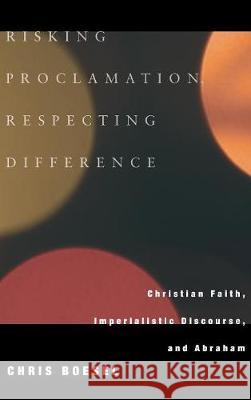Risking Proclamation, Respecting Difference » książka
Risking Proclamation, Respecting Difference
ISBN-13: 9781498210911 / Angielski / Twarda / 2008 / 308 str.
Risking Proclamation, Respecting Difference
ISBN-13: 9781498210911 / Angielski / Twarda / 2008 / 308 str.
(netto: 235,95 VAT: 5%)
Najniższa cena z 30 dni: 243,65
ok. 16-18 dni roboczych.
Darmowa dostawa!
This is a work of Christian theology that Karl Barth might call an ad hoc or secondary apologetic. Relying on a paraphrase of Anselm--""faith seeking the ethical""--Boesel engages modern and postmodern theologians and philosophers--from Kierkegaard to Barth, Ruether, Hegel, Derrida, and Levinas--to analyze the imperialistic dynamics entailed in the churchs theological interpretations of the Jewish neighbor. He demonstrates the dimensions of the problem as they are paradigmatically visible in the evangelical theological assumptions of Karl Barth. Turning to Ruethers exemplary remedy of the problem, Boesel illumines the ways her analysis and critique are funded by a specific cluster of modern assumptions that constitute what he calls ""modern ethical desire."" Employing a reading of Levinas and Derrida, Boesel shows that these assumptions constitute an imperialistic discourse of a different order, with its own specific hostility toward the Abrahamic tradition. In light of these postmodern critiques, Boesel returns to Barth to suggest that his evangelical theological assumptions, while indeed amounting to a form of Christian interpretive imperialism in relation to the Jewish neighbor, may nevertheless determine and delimit the knowledge and speech of Christian faith in such a way that resists more toxic forms of Christian imperialism. Broader implications of the argument follow: The ethical faces a radical limit, both in general and in relation to concrete faith. Therefore, no human remedy for the imperialistic discourse of Christian faith presents itself that does not entail an interpretive imperialism. To paraphrase Derrida: there is always an interpretive imperialism. Ethically, then, there is only discernment between different forms of interpretive imperialism. Theologically, an understanding of Christian faith as irreducible to the ethical may offer surprising though always risky ethical resourcement within this predicament of radically limited ethical possibility.""In Risking Proclamation, Respecting Difference, Chris Boesel has dared to host a dialogue among Karl Barth, radical postmodernists, religious Jews, and those Christian theologians who seek both to follow Christ and not turn their backs on the People Israel. This is one of the essential dialogues we need to have today, and Boesel is a most able host. He has set the table and served his delicious meal--with provisions for our various diets and with an invitation to eat according to our own tastes. Now it is time for us to converse!""--Peter Ochs, University of Virginia""This book is at once vigorous and vulnerable. Respecting the Jewish neighbor invites the Christian to learn anew the strangeness of Christianity. For Boesel, proclamation has a chance of becoming authentic when it realizes it inevitably involves ethical risk.""--Walter Lowe, Emory University (Professor Emeritus)""Can Christian proclamation be made ethically safe for the Jewish neighbor? Or does the question itself harbor a hidden danger as serious as the one it seeks to remedy? In Chris Boesels skillful hands, these questions become highly sensitive diagnostic tools for assessing the strengths and weaknesses of two major approaches to a Christian theology of Judaism, those exemplified by Rosemary Radford Ruether and Karl Barth. In clear, surefooted, and subtle prose, Boesel shows that the strengths and weaknesses of these approaches are seldom what they appear to be at first glance. Boesel makes an important contribution to our understanding of systematics, ethics, and homiletics at the intersection of Jewish-Christian relations.""--Kendall Soulen, Wesley Theological SeminaryCHRIS BOESEL is Assistant Professor of Christian Theology at Drew Universitys Theological School and Graduate Division of Religion.











